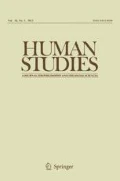Abstract
Richard Rorty challenges Jurgen Habermas's belief that validity-claims raised within context-bound discussions contain a moment of universality validity. Rorty argues that immersion within contingent languages prohibits any neutral, context-independent ground, that one cannot predict the defense of one's assertions before any audience, and that philosophy can no more escape its contextual limitations than strategic counterparts. Alfred Schutz's phenomenological account of motivation, the reciprocity of perspectives, and the theoretical province of meaning can articulate Habermas's intuitions.
Since any claim can be analyzed from an observer's perspective for its because-motives, it can always be shown to be context-related; but to the participant involved in the in-order-to project of establishing a claim's validity, the claim appears objectively valid until counter-evidence surfaces. Rorty, even when explaining what it is to “make a truth claim,” resorts to the observer perspective and omits reference to the in-order-to perspective, within which alone unconditional validity becomes visible. Furthermore, the expectation that one's claim is universally valid depends not on an empirical prediction that one's claim can survive hypothesized future possible audiences. Rather, because of the reciprocity of perspectives, making possible communication and a common life, theoreticians assume that others will recognize what they take to be objective or valid, independently of diverse biographical circumstances. Finally, within the theoretical province requiring relevances different from those of everyday life, philosophy articulates claims with a greater potential to arrive at universal validity than projects that aim less universally, in spite of the fact that its theoretical context is always susceptible to because motive analysis.
Similar content being viewed by others
References
Apel, K.-O. (1990). Diskurs und Verantwortung: Das Problem des Ñbergangs zur postkonventionellen Moral. Frankfurt am Main: Suhrkamp.
Brandom, R.B. (Ed.) (2000). Rorty and his Critics. London: Blackwell Publishers.
Farrell, F.B. (1994). Subjectivity, Realism, and Postmodernism. Cambridge: Cambridge University Press.
Habermas, J. (1996). Between Facts and Norms, trans. William Rehg. Cambridge: MIT Press.
Habermas, J. (2000). Richard Rorty's Pragmatic Turn. In R.B. Brandom (Ed.), Rorty and his Critics. London: Blackwell Publishers.
Hollis, M. (1982). The Social Destruction of Reality. In M. Hollis and S. Lukes (Eds.), Rationality and relativism. Cambridge: The MIT Press.
Korsgaard, C. (1996). Creating the Kingdom of Ends. Cambridge: Cambridge University Press.
Levinas, E. (1979). Totality and Infinity: An Essay on Exteriority, trans. Alphonso Lingis. The Hague: Martinus Nijoff.
McDowell, J. (1994). Mind and World. Cambridge: Harvard University Press.
Mills, C.W. (1940). Situated Actions and Vocabularies of Motive. American Sociological Review (5): 904–913.
Nielsen, K. (1991). After the Demise of the Tradition: Rorty, Critical Theory, and the Fate of Philosophy. Boulder, CO: Westview Press.
Peirce, C.S. (1940). In J. Buchler (Ed.), The Philosophy of Peirce: Selected Writings. New York: Harcourt, Brace and Company.
Psathas, G. (1980). Approaches to the Study of the World of Everyday Life. Human Studies (3): 3–17.
Rorty, R. (1980). Philosophy and the Mirror of Nature. Princeton: Princeton University Press.
Rorty, R. (1986). Pragmatism, Davidson and Truth. In E. LePore (Ed.), Truth and Interpretation: Perspectives on the Philosophy of Donald Davidson. Oxford: Basil Blackwell.
Rorty, R. (1989). Contingency, Irony, and Solidarity. Cambridge: Cambridge University Press.
Rorty, R. (1991). Human Rights, Rationality and Sentimentality. In Truth and Progress, Vol. 3, Philosophical Papers. Cambridge: Cambridge University Press.
Rorty, R. (1999). Philosophy and Social Hope. London: Penguin Books.
Rorty, R. (2000). Universality and Truth. In R.B. Brandom (Ed.), Rorty and his Critics. London: Blackwell Publishers.
Schutz, A. (1962). The Problem of Social Reality, ed. M. Natanson, Vol. 1, Collected Papers. The Hague: Martinus Nijhoff.
Schutz, A. (1967). The Phenomenology of the Social World, trans. G. Walsh and F. Lehnert. Evanston, IL: Northwestern University Press.
Scott, M.B. and Lyman, S.M. (1968). Accounts. American Sociological Review (22): 46–62.
Visker, R. (1999). Truth and Singularity: Taking Foucault into Phenomenology. Dordrecht: Kluwer Academic Publishers.
Author information
Authors and Affiliations
Rights and permissions
About this article
Cite this article
Barber, M.D. A Moment of Unconditional Validity? Schutz and the Habermas/Rorty Debate. Human Studies 27, 51–67 (2004). https://doi.org/10.1023/B:HUMA.0000012247.79184.3e
Issue Date:
DOI: https://doi.org/10.1023/B:HUMA.0000012247.79184.3e




